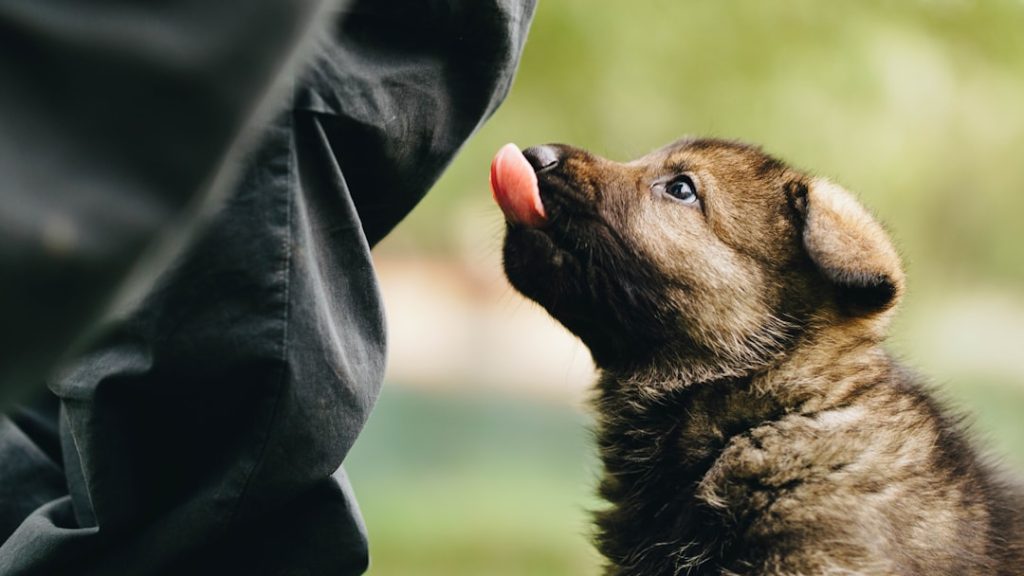Have you ever wondered how police dogs become the heroes they are? If you’re curious about how to train these amazing animals and want to make a real difference, becoming a police dog trainer could be the path for you.
This role isn’t just about teaching commands—it’s about building trust, shaping skills, and working closely with dogs that save lives every day. Keep reading, and you’ll discover exactly what it takes to step into this exciting career and start making an impact.

Credit: www.youtube.com
Role Of A Police Dog Trainer
A police dog trainer teaches dogs to help law enforcement officers. They train dogs for tasks like finding drugs and catching suspects.
The trainer also works closely with the dogs and handlers to keep skills sharp. This job needs patience and strong knowledge of dog behavior.
Key Responsibilities
Police dog trainers prepare dogs for many tasks. They teach dogs to follow commands and perform special skills.
- Train dogs to detect drugs, explosives, and weapons
- Teach dogs how to track and find people
- Help dogs learn to protect officers and catch suspects
- Care for the health and well-being of the dogs
- Work with police officers to train as a team with the dogs
- Evaluate dogs’ progress and adjust training methods
Skills Required
Trainers need strong skills to teach and manage dogs well. They must understand dog behavior and training techniques.
- Good knowledge of dog training and handling
- Patience and consistency in training
- Physical fitness to work with active dogs
- Strong communication skills to work with officers
- Problem-solving skills to handle training challenges
- Attention to detail to spot changes in dog behavior
Types Of Police Dogs
Police dogs have special jobs based on their skills. Trainers work with many types of dogs.
- Narcotics detection dogs find illegal drugs
- Explosives detection dogs locate bombs and explosives
- Patrol dogs protect officers and catch suspects
- Search and rescue dogs find missing people
- Cadaver dogs detect human remains
Educational Pathways
Becoming a police dog trainer requires special knowledge and skills. Education helps you understand dog behavior and training methods.
Many trainers start with formal education before gaining hands-on experience. This section covers key degrees and certifications.
Relevant Degrees And Courses
Several degrees can prepare you for a career as a police dog trainer. These programs teach animal behavior, training, and care.
Courses in criminal justice also help you understand police work and how dogs assist officers.
- Animal Science or Animal Behavior
- Veterinary Technology
- Criminal Justice or Law Enforcement
- Psychology focused on animal cognition
- Specialized dog training workshops
Certifications To Pursue
Certifications show you have the right skills to train police dogs. Many organizations offer recognized training certificates.
These certifications cover obedience, scent detection, and protection training for working dogs.
- Certified Professional Dog Trainer (CPDT)
- K-9 Police Dog Handler Certification
- National Police Canine Association (NPCA) Certification
- Detection Dog Certification for narcotics or explosives
- First Aid and CPR for dogs
Gaining Practical Experience
Practical experience is important to become a police dog trainer. It helps you learn skills and understand dog behavior.
Hands-on work with dogs and trainers prepares you for real training tasks. This experience builds your confidence.
Volunteering Opportunities
Volunteering lets you work with dogs and trainers without pay. It is a good way to get started and learn basic skills.
You can volunteer at animal shelters, police departments, or training centers. This gives you practice handling dogs.
- Help with dog care and feeding
- Assist in basic obedience training
- Observe professional trainers at work
Internships And Apprenticeships
Internships and apprenticeships provide guided learning with trainers. You get to practice training techniques on the job.
These programs usually last several months. They teach you how to train police dogs for different tasks.
- Learn how to train dogs for tracking and detection
- Practice using training equipment safely
- Receive feedback from experienced trainers
Working With Experienced Trainers
Working closely with skilled trainers helps you improve fast. You can see how they handle dogs and solve problems.
Ask questions and watch their techniques. This helps you understand how to train police dogs properly.
- Shadow trainers during daily training sessions
- Practice commands and rewards under supervision
- Learn how to read dog body language

Credit: www.nzherald.co.nz
Training Techniques And Methods
Becoming a police dog trainer requires learning many training techniques. Trainers teach dogs to follow commands and perform tasks. These methods help dogs work well in police jobs.
Training uses clear steps to build skills. Trainers focus on obedience, special skills, and positive rewards. These make dogs reliable and confident partners for officers.
Basic Obedience Training
Basic obedience is the foundation of all police dog work. Trainers teach dogs to follow simple commands like sit, stay, and come. This helps control the dog in many situations.
Training starts with short sessions to keep dogs focused. Trainers use clear signals and repeat commands. Consistency is key to helping dogs learn fast.
- Teach simple commands first
- Use clear hand signals and voice commands
- Practice in different places
- Keep training sessions short and regular
Specialized Skill Development
Police dogs learn special skills beyond basic obedience. Trainers teach tracking, searching, and bite work. These skills help dogs find suspects and protect officers.
Each skill uses step-by-step drills. Trainers increase difficulty as dogs improve. Dogs practice in real-like situations to prepare for duty.
- Tracking scents over different terrains
- Searching for hidden objects or people
- Bite and hold on command
- Agility training for obstacle courses
Positive Reinforcement Strategies
Positive reinforcement uses rewards to encourage good behavior. Trainers give treats, praise, or toys when dogs do the right action. This builds strong, willing dogs.
Rewards happen right after the action. Trainers avoid punishment and focus on good results. This method helps dogs learn quickly and enjoy training.
- Give treats immediately after commands
- Use verbal praise and petting
- Offer favorite toys as rewards
- Keep training fun and positive
Physical And Mental Fitness
Becoming a police dog trainer needs strong body and mind. Trainers work with dogs in many active tasks. They must be ready for physical and mental challenges every day.
Good fitness helps trainers handle dogs safely and teach them well. Mental strength helps trainers stay calm and patient during training.
Maintaining Physical Health
Police dog trainers need good physical health to keep up with dogs. They often run, walk, and do exercises with the dogs. Strong muscles and good stamina help trainers perform well.
Regular exercise, healthy eating, and enough rest are key. Trainers should also avoid injuries to stay active on the job.
- Do cardio exercises like running or swimming
- Practice strength training to build muscles
- Stretch to keep flexible and avoid injuries
- Eat balanced meals with proteins and vegetables
- Get enough sleep to recover and stay alert
Building Patience And Discipline
Training police dogs takes time and patience. Dogs learn at different speeds, and some need more guidance. Trainers must stay calm and focused during this process.
Discipline helps trainers keep a routine and follow training plans. It also helps them handle challenges without frustration.
- Practice staying calm in difficult situations
- Set clear goals for each training session
- Follow daily schedules strictly
- Use positive reinforcement to encourage dogs
- Stay consistent with commands and rules
Job Search And Career Growth
Becoming a police dog trainer takes effort and planning. You need to find job openings and work on building your career.
This guide explains how to find police departments hiring trainers, connect with law enforcement, and grow your career.
Finding Police Departments Hiring Trainers
Look for police departments that need dog trainers by checking official job boards. Local and state police websites often list openings.
Apply to departments with a clear job description that matches your skills. Volunteer or intern to gain experience if no paid jobs are available.
- Visit police department websites regularly
- Check government job portals
- Use job search engines with keywords like “police dog trainer”
- Consider internships or volunteer roles
Networking With Law Enforcement
Building relationships with officers and trainers helps you learn about job openings early. Attend events where law enforcement gathers.
Join clubs or groups related to police dogs. Talk to professionals and ask for advice or mentorship to improve your skills.
- Attend police and K9 training workshops
- Join law enforcement social groups
- Connect with trainers on social media
- Ask for informational interviews
Advancing Your Career
Keep learning by taking more courses and earning certifications. This shows you are serious and skilled in police dog training.
Look for chances to lead training programs or manage teams. Moving into leadership roles helps grow your career.
- Complete advanced K9 trainer certifications
- Attend seminars on new training techniques
- Seek promotions to senior trainer roles
- Consider teaching or mentoring new trainers
Challenges And Rewards
Becoming a police dog trainer takes hard work and patience. Trainers face many challenges while helping dogs learn important skills.
The job is also very rewarding. Trainers build strong bonds with their dogs and help keep communities safe.
Common Obstacles
Training police dogs is not easy. Trainers must deal with different dog personalities and training difficulties.
Sometimes, dogs do not respond well to training. Trainers need to find new ways to motivate and teach them.
- Handling strong-willed or fearful dogs
- Managing long training hours and physical work
- Dealing with setbacks and slow progress
- Keeping up with new training techniques
- Balancing work with personal life
Satisfying Aspects Of The Job
Trainers feel proud when their dogs succeed. Seeing a dog perform tasks well brings great joy.
The job also helps protect people. Trainers know their work makes a real difference in safety.
- Building a strong bond with the dog
- Watching dogs learn and grow
- Helping police catch criminals
- Being part of a team that protects the public
- Continuous learning and skill improvement

Credit: www.reddit.com
Frequently Asked Questions
What Qualifications Are Needed To Become A Police Dog Trainer?
A high school diploma or equivalent is required. Experience with dogs and law enforcement is preferred. Specialized training courses in canine behavior and obedience are essential.
How Long Does Police Dog Trainer Training Take?
Training duration varies from 6 months to 2 years. It includes hands-on experience with police dogs and formal education in training techniques.
What Skills Are Essential For Police Dog Trainers?
Key skills include patience, communication, and knowledge of canine behavior. Physical fitness and problem-solving abilities are also important for effective training.
Can Anyone Train To Become A Police Dog Trainer?
Anyone with a passion for dogs and law enforcement can train. Meeting educational and physical requirements, plus completing specialized courses, is necessary.
Conclusion
Becoming a police dog trainer requires dedication and patience. Start with basic dog training skills. Gain experience with different breeds. Look for specialized courses in canine behavior. Volunteer at local shelters to understand dogs better. Network with professionals in the field.
They can offer valuable insights. Stay updated with latest training techniques. Practice regularly to refine your skills. Remember, building trust with dogs is key. Enjoy the rewarding journey of working with these amazing animals. Your hard work can make a difference.
Keep learning and growing every day.

Emily Barker is the founder of ChillDogLife.com, a space dedicated to helping pup parents discover the best dog products, lifestyle tips, and cozy ideas for happier homes.
A lifelong dog lover, Emily combines her passion for pets with a knack for research to share trusted recommendations on everything from toys and furniture to health and everyday care.
Her goal is simple: to make life easier, stylish, and more joyful for dogs and the people who love them.







